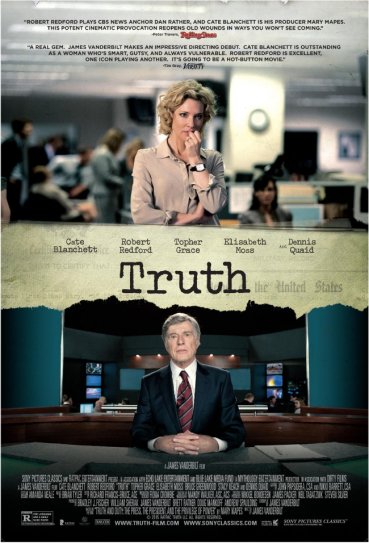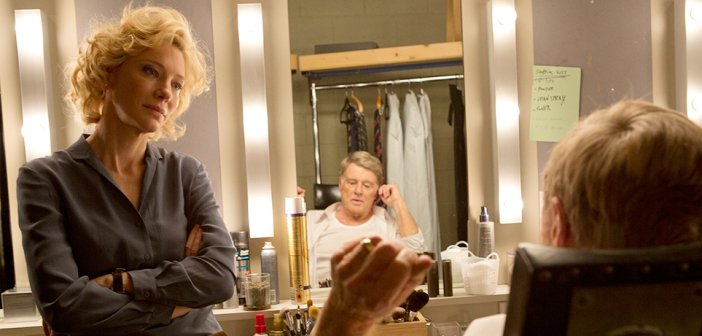Film Review | Truth has Something to Say about Journalistic Integrity
Oh, how Hollywood suddenly seems so very interested in the golden age of news reporting. It certainly makes sense, as one could argue that cinema is not in a dissimilar situation that good ol’ grind it out print media was in ten years ago. The mass migration of virtually all forms of media to online distribution has impacted both these industries immensely. Newspapers can no longer compete with rolling news and buzzfeed ‘articles’ about which Disney Princess would make the best UN high commissioner, while multiplexes are now in a battle with the instantaneous access offered by Netflix and other streaming services. This trend in journalistic films has a sense of patronising sympathy (‘oh now we get it’) and perhaps even an awareness that the writing could be on the wall.

Nonetheless a great film did come out of this. Just a few weeks ago, we saw the unquestionably important and heart-stirring Spotlight act as a glorious monument to long-haul journalism. James Vanderbilt’s Truth, is… well, it’s not that film. While no doubt a decent entry into the genre, Truth can sometimes be found guilty of espousing ‘Those were the days’, out dated moralising akin to when your granddad worries about the kind of person you might end up attracting when you go out in skinny jeans. The film centres on a now infamous investigative report on CBS’ 60 minutes that would ultimately end the career of legendary anchor Dan Rather (Robert Redford). Boasting an impressive cast, this is an easily digestible, engaging if heavy handed drama that feels pre-packaged for academy approval.
The ever watchable Cate Blanchett plays Rather’s producer Mary Mapes , who in the months leading up to the 2004 Bush/Kerry election, decides the stalwart program of nightly news should run a story questioning the military record of “Dubya” himself. In its first half, it would appear that Truth is following the same narrative beats of building the story that we saw in McCarthy’s Spotlight. Lots of bits where characters write stuff on whiteboards, stare pensively at said whiteboards, have brainstorming sessions where dialogue is economically shared and order cheap takeaway just to remind us that they’re too busy to cook anything. But that trend is soon bucked because instead of leaving it to climax, Vanderbilt has his scandal revealed much earlier on, as the film then devolves into a mediation on journalistic integrity and corporate culture in news casting.
It’s a good thing too, because as much as the movie wants us to fell aggrieved by it, the potential presidential impropriety simply doesn’t have the emotional gravitas that makes our blood boil like the scale of abuse carried out by the Catholic Church did. Is it really that surprising that a son from a political dynasty would be groomed for power via preferential treatment in the National Guard? Not really. Truth is more concerned with the aftermath of a story that may or may not have been handled appropriately by those who reported it. As sources change their statements and the authenticities of key documents are suddenly questioned, the veracity of the claims comes under attack from all sides. But who does the burden of proof lie with and do we focus too much on details when the bigger picture is ignored?
Vanderbilt looks at the events and the attempted suppression as a watershed moment in which financial gain and partisan politics were cemented as the defining traits of successful, modern reporting. As one character states when looking at a CNN report on the 60 minutes broadcast “They’re reporting on our report and someone will report on that, and they’ll be the ones given a Peabody”. The all-consuming behemoth of the 24-hours news cycle is no doubt where much of the film’s ire is aimed at. It would be commendable had Vanderbilt not decided to take the Walter Sobchak approach; it’s not that he’s wrong; it’s just that he’s a bit of an asshole about it. At times he lays it on so thick, that’s it hard to root for a film that’s about as subtle as an inebriated Boris Johnson in a library. There are not one but two big Oscar speech moments, the first occurring during an eye rolling “the systems rigged” resignation speech that’s soaked in martyrdom, and as for the scene of the big broadcast, Vanderbilt feels the need to remind just how bloody important it all is. As Rather speaks, the music swells, America watches and our characters share smug, self-satisfied looks with one another, I start to wonder if maybe the patriot act isn’t that bad after all.

This is all quite unfortunate because there’s certainly a better and more intelligent film that rears its head every so often. To the surprise of absolutely no one, Truth’s saving grace is in the incalculable talent of Blanchett. Compared with turns in Blue Jasmine and Carol, Mapes may not be her most accomplished performance in recent memory but she brings more than enough here to not only elevate the material considerably but also remind us that in decades to come, her name will surely hold the kind of prestigious weight that the Hepburns and Davis do in the same field. Blanchett is sincere and subdued here, drawing sympathy for a character in a film that mostly lacks it. In a brief, soul crushing phone call with an abusive father we see a childlike reversion and an actress who does more with three words than most do with entire careers.
Less fortunate, are the horrendously underdeveloped “crack team” that surrounds Mapes , which includes quirky character tropes like the lefty conspiracy hippie (Topher Grace), a former military man with conscience (Dennis Quaid) and the woman (Elizabeth Moss). Moss, an immensely talented actress, finds herself particularly shafted as her character vanishes without a trace a third of the way through only to re-emerge in the epilogue so that everything can be tied up in nice little bow.
Truth is not an awful picture, just an incredibly frustrating one. The true life story it’s based on certainly makes one realise that political divides and gut reaction blogging has made us more distrusting of those revealing the corruption than those who carry it out, and Vanderbuilt does get this across in the climax. Any well observed insights however are marred by the preachy tone and overbearing lecturing. Truth’s heart is in the right place but its brain can be as half-witted as the audience it thinks it’s talking to.
SIX / TEN
Truth is out in selected cinemas on Friday 4th March. Check out the trailer below.
[youtube id=”MqOz8-Sto1g” align=”center” autoplay=”no” maxwidth=”750"]
Featured Image Credit

